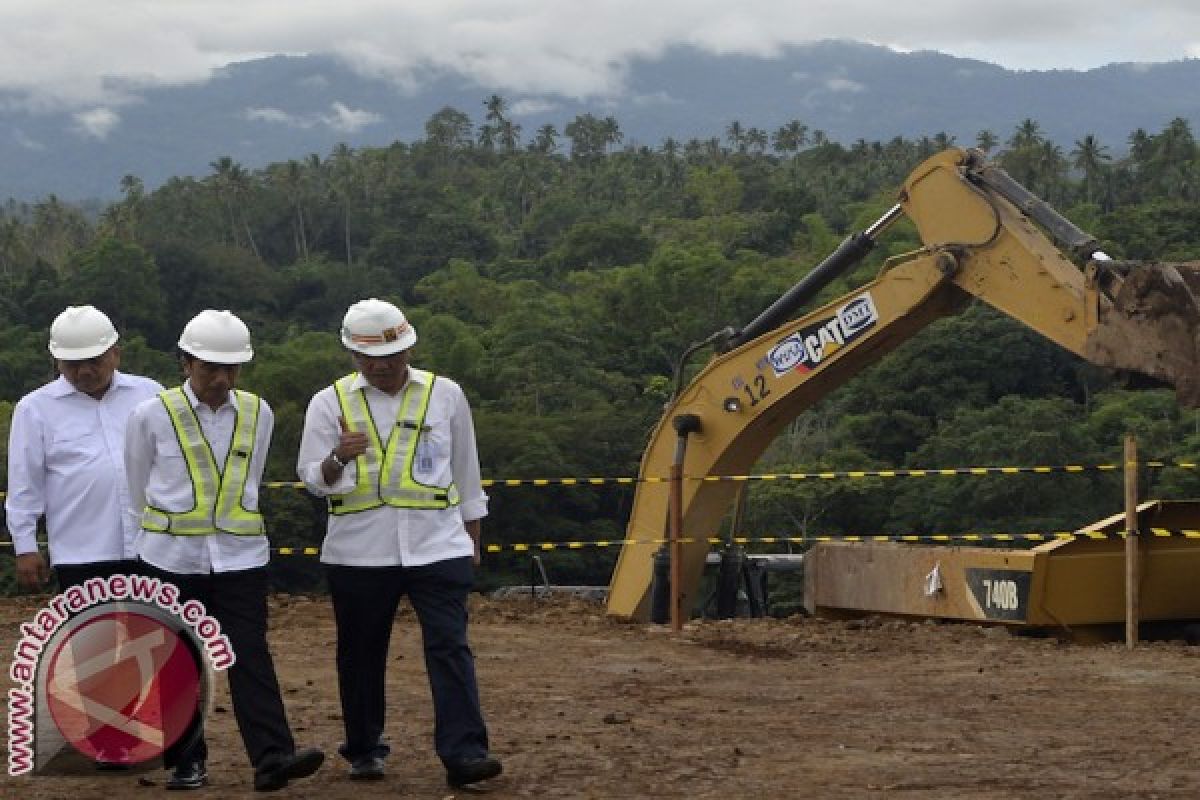The dam was built to reduce floods in Manado and the surrounding areas by 282.18 cubic meters per second."Jakarta (ANTARA News) - Expected to be completed in 2019, the Kuwil dam in Kawangkoan, North Minahasa District, will be a giant reservoir in the Indonesian province of North Sulawesi.
Kuwil dam, with a perspective of a lake extending across 308 hectares of land and with a water volume of up to 23 million cubic meters, will be the largest reservoir in the province upon completion.
The giant dam could improve the welfare of the locals, allowing them to irrigate extensive rice fields, generate electricity, and enjoy other economic activities.
President Joko Widodo (Jokowi), on visiting the Kuwil dam site, remarked on Tuesday that the dam will serve as a raw water reserve for the region, including Manado, Bitung, North Minahasa, and the surrounding areas.
In addition, the president noted that the dam will help control flooding from the Tondano River and will become a tourism attraction.
On land acquisition, the president said there were no significant problems for the development of the giant reservoir.
A number of tombs remain in the selected field and have not yet been relocated, but the president claimed their removal was only a technical matter.
The government moved up the completion of the dam from 2020 to 2019 to extract immediate benefits for the local community.
The Public Works and Public Housing Ministrys Director General of Water Resources Imam Santoso noted that the dams development had progressed to two percent.
According to him, the construction of the dam is a strategic initiative that will benefit the local community.
Imam noted that a 1.8-kilometer driveway and a dodger tunnel were currently being constructed.
The dam will require 306 hectares of land; so far, only 128 hectares have been acquired.
Imam said the acquired land is being used for the driveway and will not face any obstacles.
"The rest of the land will be acquired by involving the provincial government, but in principle, the land owners are ready to move," Imam affirmed.
The construction of the dam will cost the state budget Rp1.43 trillion. Some Rp78 billion has been spent on the acquisition of the 128 hectares of land.
Discussing the development, Imam noted the contractor needed to break through a hill and clear the mountain trail.
Imam revealed the project had been fast-tracked for completion in 2019 as its development had gained support from the North Sulawesi administration, the North Minahasa district administration, and the local residents.
"The dam was built to reduce floods in Manado and the surrounding areas by 282.18 cubic meters per second," Imam reported.
Located near the Tanggari Hydro Power Plant II, this is one of eight new dams being built this year. The government has set a target of building 65 dams, comprising 16 uncompleted dams, built in 2014, and 49 new dams.
The Ministry of Public Works and Public Housing has set a target to complete the tender process for eight dams, worth a combined Rp8.6 trillion (approx. US$637 million).
Imam added that 49 of the dam construction projects---all scheduled for completion by 2019---were considered strategic national programs by the Indonesian government.
Of these 49 dam projects, 16 were tendered in 2014 and are currently under construction. Another 13 dams were tendered last year.
The construction of a dam is a complex process that can take up to five years to complete.
In the past, the construction of dams in Indonesia was blocked by land acquisition problems---a major issue affecting all forms of development in Southeast Asias largest economy, typically leading to the delay or cancellation of numerous infrastructure projects.
However, Imam stressed, part of the land required to construct the new dam had already been acquired before the project was tendered, implying that construction could begin immediately after the winner is announced.
If the construction of these dams is completed as planned, they will be capable of holding enough water for the irrigation of 38.4 thousand hectares of agricultural land and of facilitating flood prevention.
These dams are also expected to generate a combined 20.74 MW of power.
(T.O001/INE/KR-BSR)
Reporter: Otniel Tamindael
Editor: Priyambodo RH
Copyright © ANTARA 2016










